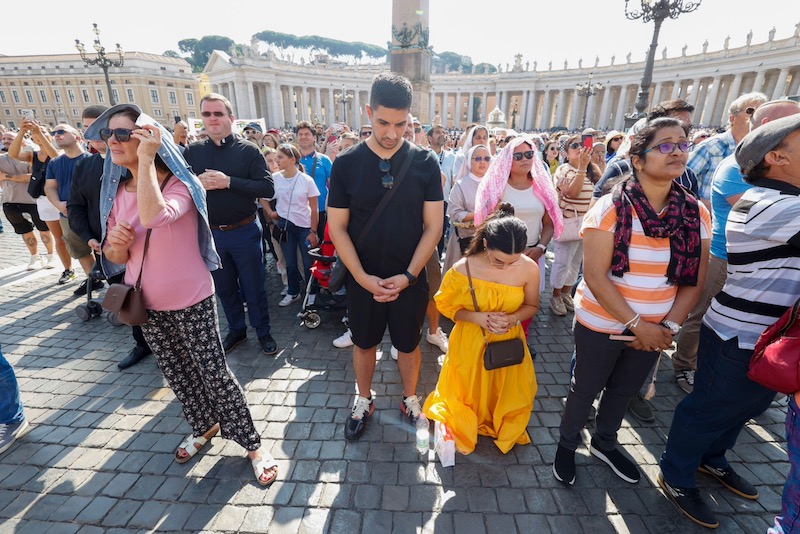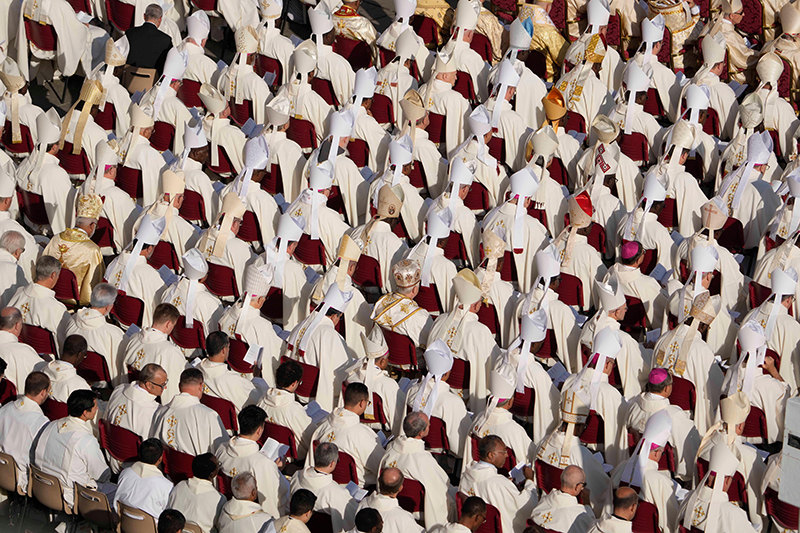Today, Pope Francis publishes a new document calling all to urgent action on our planetary crisis. The pope’s clear moral leadership should inspire the government of Prime Minister Sunak to do better.
The new papal document, Laudato Deum, stands on more than 30 years of Catholic teaching on climate change and ecology. Catholic interest in climate change is not a fad, but rather a long-standing concern rooted in core values. While Pope Francis is often painted as a left-of-centre leader, within the Church this is not an issue of left or right.
Popes that many would consider more conservative, including St. John Paul II and Pope Benedict XVI, have spoken about the climate, making this a widely embraced concern for the Catholic Church as a whole. As the bishops of England and Wales put it, ‘It has become clear that what was once a “major challenge” for the whole of humanity has now become an unprecedented ecological crisis.’
But the Catholic Church isn’t alone in being concerned about climate change. The Church of England has made a credible commitment to net zero and divested from oil and gas companies. The Muslim Council of Britain equips volunteers to address sustainability and climate change within communities. Sikh and Buddhist communities across the world have mobilised to re-generate sacred forests. All faiths are now prioritising action on climate.
This exemplary leadership at the top levels is being taken up by the thousands of faith institutions within denominations. One of the most impactful ways that institutions are taking action is by aligning their investments with their beliefs and values. Finance underpins everything that fossil fuel companies do, from getting the money for new drilling projects to securing insurance for this dangerous work. Since the Paris climate agreement was signed, the world’s 60 largest banks have poured $5.5 trillion into the fossil fuel industry, with $673 billion coming in 2022 alone, according to research from Fossil Free Funds. The finance industry makes the fossil fuel industry possible. If finance goes away, fossil fuels go away.
Faith institutions realize they have a critical role to play in the transition to a new energy economy. These institutions are major asset owners and have billions of dollars invested in global markets. By investing in line with their values, screening out harmful investments and embracing vehicles that protect the planet and its people, they are contributing to a tidal shift in the economy.
Leaders do not make these decisions lightly. Conversations within the FaithInvest network, which grows the scale and impact of faith-consistent investing, reveal a strong need for clarity and stability in key policy decisions. Investors need to know that the decisions they make today won’t have unintended consequences tomorrow. This is one of the many reasons that Sunak’s decision to step back from the UK’s legally binding net zero commitments is so disappointing.
The very day that the PM made his announcement, over 400 NGOs and businesses including UKSIF, Nestle, IKEA, Brunel, Aviva Investors and EON wrote an open letter to him, laying out their concerns over the watering down of net zero commitments. This kind of quick, united action is extremely rare among institutional investors, and is a sign of how seriously they take this issue.
Repercussions within the industries that the Sunak government is undermining have been immediate. Within the auto industry, one of the sectors targeted, an industry group predicts decreased investment in the UK’s electric vehicle industry, and Ford UK itself says that investors need “ambition, commitment and consistency” from government. Within the domestic heating industry, another targeted sector, the scrapping of a heat pump investment roadmap published just five months ago is farcical. Leaders in the building industry “beg to differ” with Sunak’s characterization of heat pumps as being ill-suited for certain buildings and say that his backtracking was “very disappointing”.
Faith-aligned investors want the ambition and consistency that all investors want. But this group goes a step further. They want to know that government is acting in the best interests of all humanity. Sadly, it is not possible to say that of government at the moment. We must look to leaders like Pope Francis and others for the moral leadership we so urgently need. As people of faith, we pray that the prime minister begins to look in that direction, too.
Lorna Gold is the Executive Director of FaithInvest, a UK-based charity, and president of the board of directors of Laudato Si’ Movement, a global network of Catholics acting for climate and ecological justice



 Loading ...
Loading ...
What do you think?
You can post as a subscriber user ...
User comments (1)
Couldn't agree more. It would be all too convenient to use this to marginalise the 'unproductive' still further.
There's a common pattern of people reacting in fear to the idea of no longer being in control, and feeling this would give them back some control. But they need to realise it would actually be used to the take the control and choices of many away.
Never give a government an apparently 'moral' reason for withdrawing protection from the vulnerable. Sooner or later, they will grab it with both hands.